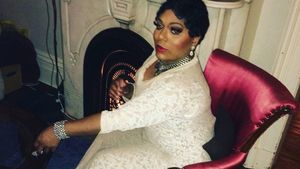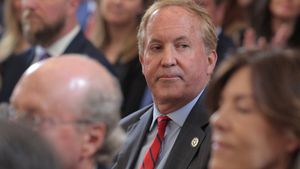Since childhood, many millennials have been taught that it's rude to ask too many questions about money, especially about how much we're paid compared to other people.
Writer Gaby Dunn is going after that taboo with a sledgehammer.
The prolific journalist, podcaster, YouTube star, and LGBTQ activist has a long history of pulling back the curtain on financial issues, from her viral essay about the flipside of "You'll Never Guess How Much These YouTubers Make in a Year!" clickbait articles, to a pointed critique about her time working for BuzzFeed and the dangers of signing away the rights to your online content for the sake of "exposure."
Dunn's podcast Bad With Money, launched in August 2016, is a big hit with millennial listeners, giving them a sympathetic perspective on spending habits and personal finance—topics we're endlessly lectured about by financial publications that seem increasingly out of touch with today's struggling workforce. Now, her new book of the same name is taking that perspective to mainstream audiences.
We caught up with Dunn in the middle of her book tour to find out how people are reacting to the book, and what she thinks of the latest discussions about broke, burned-out millennials trying to make ends meet.
PRIDE: You started the Bad With Money podcast in 2016. Did you ever imagine it would get the huge response it's gotten?
Gaby Dunn: I'd written an article right before we did the podcast called Get Rich or Die Vlogging, and it was about money transparency within the YouTube community. That specific article has gotten a lot of attention. I knew that people were jonesing to talk about money, and that is what gave me the inkling to do a podcast about it.
My normal thing would be to do some sort of podcast about LGBTQ issues or sex positivity, which is stuff I had talked about in the past. I had never really talked about money before this one article. I was like, okay, money is really occupying a lot of space in my mind right now and making me super anxious, it's the biggest thing that I cry about. So let's poke the wound!
I knew that if it was bothering me, it must be bothering other people. If I feel this way and I don't feel like I can talk to anyone about it, that's a pretty good indication that other people are also isolating themselves around a certain topic. I didn't know that people would want to listen. I still get people responding saying, "I really want to listen to your show but it gives me anxiety." I kind of thought that would be the status quo, that it wouldn't get a lot of listenership because people would be like, "Ooh, no thank you."
What does a book on this same topic let you do that the podcast doesn't?
The response I've gotten so far is there hasn't really been a money book that wasn't written for a certain subset of the population, namely cis straight able-bodied neurotypical white people—specifically men, but also white women. There hasn't really been someone coming at the money game from a queer perspective.
I'm not going to talk to you about credit cards without explaining why black people might have a harder time getting credit cards. I'm not going to talk about retirement without mentioning what a couple of friends of mine who do a podcast called Queer Money witnessed, when they worked in marketing for retirement, which was that there was practically no money given to marketing to the LGBTQ community. So I'm not going to go at these topics pretending that everyone's on an equal playing field, and that's what the book is about.
Obviously I give advice, but I think there's a way to do that [without making] you feel bad if you're behind the ball, because this is what we're dealing with.
We keep seeing traditional media writing about money and budgeting, scolding millennials about their spending habits — like, "If you want to buy a house, stop buying avocado toast."
So stupid.
And then you read their examples of a "responsible" millennial and you find out their parents are covering their rent, or they have extra money coming in from other places. Why do you think these articles keep getting written over and over, despite all the pushback they get?
It benefits the status quo to believe that everything is your fault. I think it's easier to shame someone for their personal habits than it is to acknowledge that healthcare costs have risen, housing costs have risen, college costs have risen. You're less likely to get a standard nine-to-five, and if you do, that job might not even have health insurance, or they might not allow you to contribute to a pension or 401K. There's all these changes in the way the world works, and the people who are mad at us are like, "Why don’t you do what I did?" It's a different world now, so your advice doesn't really hold water.
I just saw a really interesting thread on Tumblr [about how] "my parents keep telling me to get a job, I should go into the building and give my resume to the manager." Then it was a bunch of millennials and Gen-Z [people] talking about how when they've done that, the [manager] has been like, "Can you just e-mail me, you freaking weirdo?" The point was that the advice you're getting from older people, like "pull yourself up by your bootstraps" and "show your face and be a good worker," isn't a thing.
It's easier to make things into personal failings than it is to be like, "We need to change legislation, we need to be voting in people who believe in student loan forgiveness or universal health care. We need to be looking seriously at candidates who are interested in universal basic income." I've heard tales of teenagers in different cities going to school board meetings and asking for classes on financial literacy to be added to their schedules. But that stuff isn't going to get the clicks of broad-strokes shitting on a younger generation, which has always happened. The Baby Boomers don't even remember, but their parents shit on them. It's this ongoing cycle.
In the book, I talk about how when we talk about millennials in that sense, what we're talking about is upper middle class millennials. I interview a friend of mine, Nona Willis Aronowitz, and she does a lot of reporting on poverty. She says there'll be all these articles saying "millennials do this, this and this." But a 25-year-old Latinx millennial with two children who lives in east Texas isn't doing avocado toast, doesn't have student loan payments. The minimum wage is a millennial issue. Most of us work in the food service and retail industry, but we never think about it as a millennial issue. So it's easier to stereotype than it is to actually think about things that could affect policy in a grander way.
Speaking of focusing on policy and legislation, we just had the new Congress sworn in. Do you find the increased diversity in the House and Senate encouraging?
Yeah, it's really touching to see the first two Native American women representatives in Congress hugging, or the video of Rep. Ocasio-Cortez dancing into her office, or the first bisexual representative [Arizona Senator Kyrsten Sinema]—who looked incredible, I know you're not supposed to say that, but wow, she looked bomb. It's very encouraging. I hope that they are able to move the barometer, because it's so stuck. A lot of financial problems can't be fixed by the individual. [People are] already so stacked against that it has to come from higher up.
A lot of companies like to use diversity as a big selling point for marketing, but it always seems to be white, straight, cisgender, able-bodied men who are profiting from it. How should marginalized people in this job market work to defend their own interests?
Listen, I worked at BuzzFeed. That's the definition of what you just talked about. All the people at the bottom are besties and almost all queer people of color, and those are the front-facing people of the company—not just at BuzzFeed, but all kinds of companies. And then behind the scenes, the people at the top are straight white dudes. When you look at the salaries of [diverse employees], they are much less, and the contracts are very unfair.
I used to think, "Well, they won’t do anything bad to me." Guess what: they will and are. I think a lot of minorities have learned to make ourselves small and not get noticed. I constantly thought if I even made a noise, they'd fire me. "I've got to be on best behavior." But you know what? You don't. Maybe someone will be like, "Wow, that queer person is always causing trouble," but fuck 'em.
Read through the contract. Get a friend in law school or put out a call on Facebook for anyone who might know anything legalese, and get them to look at your contract. Negotiate your salary. And don't feel like you're obligated to be nice to the company. If your white boss or your straight boss is like "we're all friends here," you're not. You're an employee and they're a boss and they're not your friend. Don't let them guilt you into doing things for free or working overtime. Free beer and a ping-pong table is not health care.
Go to HR and look at your 401K and [find out] if the company will match your contributions. Be on top of tax deductions getting taken out—I never knew if I was going to get a refund check or if I was going to owe money. You can be a nudge, you can go to HR and ask a million questions. That what they're there for.
Also, if you're working somewhere, always be on the lookout for other, better-paying jobs. Why not? You don't owe anybody shit. If another company comes to you like "we're better," don't be like "Oh no, my friends at my other company will be mad." You’ve got to look out for number one.































































































































